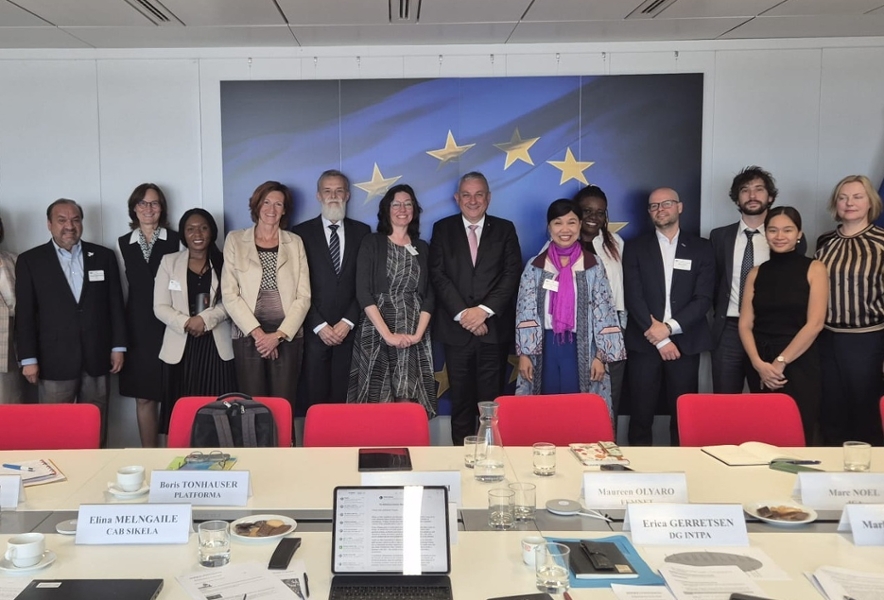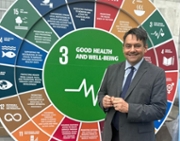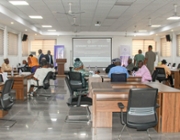Working towards more inclusive and effective partnerships with the EU

30 June 2025
Working effectively with the European Union on development issues will help achieve a sustainable and successful future for all. Local and regional governments, together with civil society organisations, were pleased, therefore, to meet with the European Commissioner for International Partnerships, Mr Jozef Síkela, in June to present the outcomes of the 2025 Policy Forum for Development (PFD) and to discuss the EU’s simplification agenda.
Attended by CLGF Head of Programmes, Claire Frost, who represents the global local government constituency on the PFD Task Team, the event provided a space for local and regional governments (LRGs), civil society organisations (CSOs) and the wider set of PFD constituencies to share the key outcomes of the 2025 Global PFD meeting, as well as to reflect on the future of EU development cooperation.
Commissioner Síkela opened the forum by presenting his strategic vision, putting investment-driven solutions at the core of the EU’s development cooperation agenda, through the Global Gateway. He underlined the importance of partnerships, especially in fragile contexts where civil society and local authorities are often the EU’s most reliable actors. He committed to working closely with these groups at every stage of the Global Gateway initiative, stressing their unique role in reaching local communities and driving progress toward the Sustainable Development Goals (SDGs).
Preserving distinct instruments and reinforcing funding
Members of the PFD Task Team followed with reflections and recommendations based on recent consultations and dialogues. They called for greater engagement of local actors in shaping Global Gateway projects and highlighted the need to safeguard civic space as a precondition for meaningful participation. They stressed the urgent need for the EU to better recognise and acknowledge local authorities as fully-fledged partners in development cooperation. They emphasised the need for the recognition of local and regional governments in the next Multiannual Financial Framework (2028–2034), including through formal framework partnership agreements, and the need for maintaining a dedicated CSO-LA Unit at DG INTPA to support long-term engagement.
CLGF interventions
CLGF’s Head of Programmes focused her intervention on the need for the EU to preserve distinct instruments for international cooperation, humanitarian aid, and accession, while reinforcing the importance of funding that addresses the root causes of fragility rather than merely responding to crises. She also called for the return of the dedicated thematic budget line for local government as well the dedicated focal points for local authorities within EU Delegations. The meeting also highlighted the important role of LRGs in the delivery and oversight of Global Gateway initiatives.
The PFD Task Team urged the EU to uphold its commitments to development financing and ensuring that financial support for local actors is both increased and made more predictable. They also emphasised the need to strengthen platforms like the PFD as vehicles for trust-building, information sharing, and coordination among stakeholders at all levels.
Simplification of EU programmes
In the second part of the meeting, the dialogue shifted toward practical improvements in EU programme implementation, particularly around simplification. The task team offered concrete suggestions for tailoring EU procedures to local realities. They stressed that funding mechanisms must be flexible, accessible, and responsive to the needs of communities on the ground. Proposals included streamlining application and reporting processes, aligning administrative requirements across EU departments, and adapting eligibility criteria to reflect economic conditions in partner countries.
Specific emphasis was placed on improving access to information and reducing bureaucratic barriers. Participants called for more user-friendly websites, the translation of key documents into local languages, and the establishment of focal contact points in EU Delegations to guide local actors through complex procedures. They also recommended strengthening the capacity of small organisations and local governments through targeted support and simplified grant modalities.
A performance-driven approach
In his closing remarks, Commissioner Síkela reaffirmed his commitment to simplifying EU development cooperation - not to ease the burden on EU Delegations, but to better serve its partners. He advocated for a performance-driven approach that avoids unnecessary overheads, and stressed the importance of balancing urgent needs with long-term strategy. Above all, he emphasised that future success hinges on the ability of the EU to work directly and effectively with those closest to the challenges - local authorities, civil society, and the communities they represent
This event marked a strong step toward more inclusive, grounded, and effective development partnerships, placing local and regional governments at the heart of the EU’s international agenda.
Back to News





